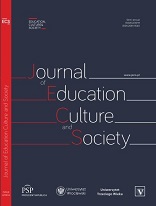THE RHIZOMATIC LEARNING FROM A PERSPECTIVE OF POSTSTRUCTURALISM
THE RHIZOMATIC LEARNING FROM A PERSPECTIVE OF POSTSTRUCTURALISM
Author(s): Aida KairienėSubject(s): Social Sciences, Education, Sociology of Education
Published by: Fundacja Pro Scientia Publica
Keywords: rhizomatic learning;Deleuze Guattari;becoming;nomad
Summary/Abstract: Aim. The postmodernism manifested itself in the second half of the 20th century. The branch of postmodernism is poststructuralism - in fact, it was called French poststructuralism, with the dominant philosophy being “68 philosophy” (Marshall, 2004). In that period, alongside influential works such as Derrida “On Grammatology” (1968), M. Foulcalt “The Madness and Civilization” (1967), J. Kristeva “Semiotics” (1969) emerged and Deleuze, Guattari personalities. According to the Eurydice study, 9 out of 10 students in the European Union study English. Students can learn English not only in formal but also in non-formal and informal forms. This enables the development of rhizomatic learning, which origins lie in Deleuze, Guattari (2004) philosophy. Thus, the problem – related question arises: what is the essence of rhizomatic learning from a perspective of poststructuralism? The aim of the study is to review theoretical considerations in order to reveal the essence of rhizomatic learning from a perspective of poststructuralism. Method.The research method – a scientific literature review. The literature review examines relevant, current, and recent literature (Grant & Booth, 2009). The literature review is based on philosophical and educational insights. The following sources have been selected for the analysis of rhizomatic learning of English: 1) philosophical and educational books that help to reveal the essence of rhizomatic learning; 2) publications and dissertations on the issue of rhizomatic learning, which helped to analyse the essence of rhizomatic learning from a perspective of poststructuralism. Results. The antecedents of rhizomatic learning are rhizome and other Deleuze Guattari's (2004) concepts as assemblages, becoming, nomad. The rhizomatic learning based on Deleuze Guattari's (2004) term of rhizome, which has neither beginning nor end (Cormier, 2008), providing a dynamic, open, personalized learning network created by learners themselves that meets their perceived and real needs (Lian, Pineda, 2014). The concept of rhizomatic learning has its own meaning, but is closely related to the concepts of Deleuze, Guattari (2004), such as rhizome, assemblage, becoming, nomad, and so on. It should be noted that the rhizomatic learning from poststructuralism perspective develops and manifests itself through various 'moving' Deleuze, Guattari’s (2004) concepts. The consequences of rhizomatic learning show that rhizomatic learning could be applied successfully in educational science as learning foreign languages in various learning forms. Conclusion. The scientific analysis revealed that rhizomatic learning develops through Deleuze, Guattari concepts, especially through becoming learner and occurs in lifelong learning of English.
Journal: The Journal of Education, Culture, and Society
- Issue Year: 11/2020
- Issue No: 1
- Page Range: 102-115
- Page Count: 14
- Language: English

